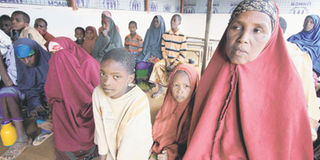Aid agencies make funds appeal

Somali refugee Nuriyo Aden, 40, and her two children wait to be registered at the Dadaab camp in this file photo. Relief agencies working in the camp say they might be forced to close shop in three months for lack of funding July 12, 2012.
Relief agencies working in the Dadaab refugee camp have said they might be forced to close shop in three months for lack of funding.
In statement, eight aid organisations working in Dadaab said increasing insecurity coupled with the exploding number of refugees have made the camp to be “untenable” because they have run out of funds.
"There are over 465,000 refugees, a volatile security situation and restrictions in the movement of humanitarian workers.
"The Dadaab camps have existed for over 20 years, but in 2012, the needs of the refugees are greater than ever before,” said the statement titled The Human Costs of the Funding Shortfalls for the Dadaab Refugee Camps.
The agencies, CARE, Catholic Relief Services (CRS), Danish Refugee Council (DRC), International Rescue Committee (IRC), Lutheran World Federation (LWF), Oxfam, Save the Children, and Terre des Hommes (TdH) are calling on the international community to avert an imminent catastrophe like that experienced in 2011.
If more funds are not received immediately, the situation in the camps will deteriorate as vital health, nutrition, education, shelter is inadequate, they warned.
According to figures from the UN refugee agency, UNHCR, Dadaab’s population increased to over 465,000 people last year following a long dry spell that forced people to flee from Somalia to camps in Kenya.
Other figures state the camp, which was originally meant to host 90,000 people could be holding as much as six times this figure.
World has not noticed
The organisations said the needs in the camp have also increased although the world has not noticed. At least $25m (Sh2.1 billion) is needed urgently to help reach half of this population which the agencies claimed have not had good shelter since arriving at the camp.
According to them, 130,000 refugees who came in this year have no adequate shelter because their tents were destroyed in the heavy rains. While these people need 30,000 new shelters, the agencies said they can only afford 4,000.
At the moment, patients in overcrowded camps are either sharing beds or are not getting the service at all because the agencies can no longer hire community health workers.
And with the increasing security threats in the region, the agencies now claim it is even more difficult to hire people to work in the region both as nurses and teachers. Refugees themselves have become targets of sexual violence as the camps become less policed.
“Twenty per cent of families in Dadaab face threats, harassment and discrimination. Women and children face sexual violence while collecting firewood or walking long distances to use poorly-lit latrines,” they said.
The calls come just five months after the UK hosted a 50-nation conference in London after which countries pledged to coordinate in sending aid, supporting war against the Al- Shabaab and helping Somalia regain a stable government it lost 20 years ago.
Last month, two agencies, Save the Children and Doctors without Borders (MSF) asked countries in the region to share out refugees to reduce the burden held by Kenya. They also asked donors to honour the pledges made at the UK conference.
“The funding shortfall means people who have fled unimaginable suffering are not getting the care they need. There is also a cost to security in the region. If children are not going to school and if people do not have proper shelter and other services, this has the potential to fuel,” said Stephen Vaughan, head of CARE Kenya.
The agencies called on the international community to rethink its approach to long-term solutions for the camp, and warned that the gaps in aid could make the camp to become a militia-making centre for discontented refugees.

